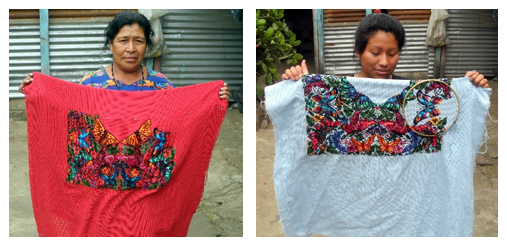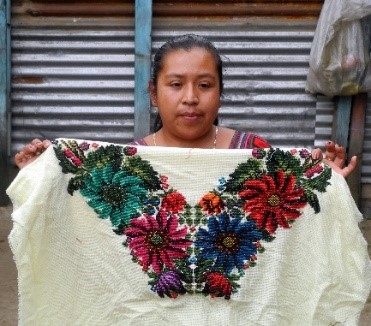Guatemala is the northeast country of Central America. Sacatepéquez is one of its Departments (state) with 16 municipalities, Sumpango being one of them. Recent study has shown that the percentage of indigenous population in this Department is high and there are more women than men. Its main source of income, besides tourism, is agriculture including coffee, sugar cane, wheat, corn, beans etc. For handicrafts, it is one of the most important departments where typical fabrics are made, and many typical costumes are worn by the indigenous people. There is significant poverty with very limited opportunities for employment and businesses.
Rotary clubs are working on various ways to alleviate poverty, one of these ways is to provide financial services for disadvantaged people. These are powerful instruments for reducing poverty by enabling clients to increase incomes and reduce their vulnerability to economic stress. Microfinance has built a solid track record as a critical tool in the fight against poverty and has entered the financial mainstream. The rapid growth of microfinance has reached almost 130 million clients over the past fifteen years. Microfinance has also been an especially powerful catalyst for empowering women.
Barrington Breakfast Rotary Club, District 6440 in partnership with Club Rotario Guatemala Sur, District 4250 has initiated a microfinance program in the Sumpango municipality of Sacatepéquez Department of Guatemala under global grant #GG1411300.
Barrington Breakfast Rotary Club, District 6440 in partnership with Club Rotario Guatemala Sur, District 4250 has initiated a microfinance program in the Sumpango municipality of Sacatepéquez Department of Guatemala under global grant #GG1411300.
 Project Objectives – The objective for the microfinance program is to finance weavers of Sumpango, Guatemala in groups of ten. Three groups of ten women each are financed at an interval of approximately three months. Q3,000 (USD $400.00 approx.) is authorized for each person in the form of a credit for materials and supplies for different classes of weaves/fabrics, which will be paid back in 12 installments of Q250.00 plus interest each month. A total sum of Q90,000 (USD $12,000 approx.) has been set aside for the program. This program complements the skills of the indigenous women and gives them an opportunity for income generation through sale of their products.
Project Objectives – The objective for the microfinance program is to finance weavers of Sumpango, Guatemala in groups of ten. Three groups of ten women each are financed at an interval of approximately three months. Q3,000 (USD $400.00 approx.) is authorized for each person in the form of a credit for materials and supplies for different classes of weaves/fabrics, which will be paid back in 12 installments of Q250.00 plus interest each month. A total sum of Q90,000 (USD $12,000 approx.) has been set aside for the program. This program complements the skills of the indigenous women and gives them an opportunity for income generation through sale of their products.The participants would weave with local designs. The materials and supplies are acquired by the Municipality and given to the weavers at cost. The Municipality will help them with the sale of the products. Rotarians provide training to the Municipality staff and the participants about the various aspects of microfinance, marketing and maintaining accounts.
 Business Plan: Rotary clubs have entered in a Memorandum of Agreement (MOU) with the Sumpango Municipality government who will administer the program. This plan has been approved by TRF. Key elements of the MOU are:
Business Plan: Rotary clubs have entered in a Memorandum of Agreement (MOU) with the Sumpango Municipality government who will administer the program. This plan has been approved by TRF. Key elements of the MOU are:- The participants of each group will be selected by the Municipality Office of Women according to their record of responsibility and work.
- The participants will be charged 3.00% interest.
- The Municipality will not charge for administrative and financial management.
- If the total loaned amount is not paid back; the Municipality will cover the difference.
- The Municipality will return the funds paid back by participants to the Rotary club at regular intervals of time.
- The Rotary clubs have full right to terminate the program at any time and receive all collected funds.
- The Municipality will sign a contract or agreement with each participant and will be responsible for the monthly collection from the weavers.
- The Municipality will maintain detailed accounts and provide the information to the Rotary club on a regular basis.

Outcome and Impact:The program has been underway for over six months and women have started making their individual products. The number of hours they spend on making products varies from two-three hours a day to five-six hours a day from participant to participant. Typically, they sell the product at a price which is commensurate with the prevailing wages for the same hours of work. Unfortunately, employment opportunities are very limited. As a result, they embrace the microfinance option to generate income which would otherwise be very difficult to attain.

